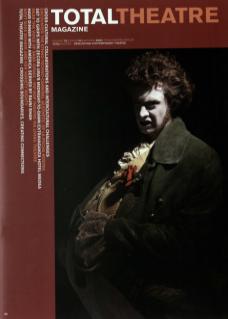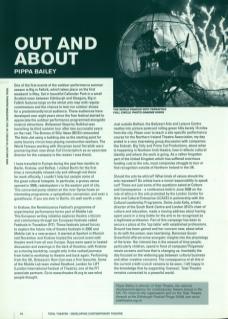One of the first events of the outdoor performance summer season is Big in Falkirk, which takes place on the first weekend in May. Set in beautiful Callendar Park in a small Scottish town between Edinburgh and Glasgow, Big in Falkirk features large on the street arts map with regular commissions and the chance to test-run outdoor shows for a predominantly local audience. These audiences have developed over eight years since the free festival started to appreciate the outdoor performance programmed alongside musical attractions. Bollywood Steps by Nutkhut was launching its third summer tour after two successful years on the road. The Bureau of Silly Ideas (BOSI) remounted The Hole Job using a building site as the starting point for some bouncy circus boys playing construction workers. The World Famous working with Slovenian band Terrafolk were premiering their new show Full Circle (which as an associate director for the company is the reason I was there).
I have travelled in Europe during the past few months to Berlin, Krakow, and Belfast. I visited Berlin for the first time; a remarkably relaxed city and although not there for work officially, I couldn't help but sample some of the great cultural hotspots. In particular, a groovy venue opened in 2006, Radialsystem V in the eastern part of city. This converted pump-station on the river Spree hosts an interesting programme, a sympathetic conversion, and even a guesthouse. If you are ever in Berlin, it's well worth a visit.
In Krakow, the Reminiscence Festival's programme of experimental performance forms part of Mobile Lab. This European writing initiative explores theatre criticism and commentary through ten European festivals called Festivals in Transition (FIT). These festivals joined forces to explore the future role of theatre festivals in 2005 and Mobile Lab is a new project. It started at Speilart in Munich last November and Krakow hosted the second event with theatre work from all over Europe. Days were spent in heated discussion and evenings in the dark of theatres, with Krakow as a moving backdrop, caught only in the rushed journeys from hotel to workshop to theatre and back again. Performing from the UK, Rotozaza's Rom Com was a firm favourite. Some of the Mobile Lab team visited Stratford, London for LIFT (London International Festival of Theatre), one of the FIT associate partners. Go to www.theatre-fit.org to see what people thought.
Just outside Belfast, the Ballyearl Arts and Leisure Centre nestles into picture postcard rolling green hills barely fifteen miles from the city. Flown over to teach a site-specific performance course for the Northern Ireland Theatre Association, my day ended in a very interesting group discussion with companies like Kabosh, Big Telly and Prime Cut Productions, about what is happening in Northern Irish theatre, how it reflects cultural identity and where the work is going. As a rather forgotten part of the United Kingdom which has suffered enormous funding cuts to the arts, most companies struggle to tour or find recognition outside of Northern Ireland in the UK.
Should the arts be ethical? What kinds of values should the arts represent? Do artists have a moral responsibility to speak out? These are just some of the questions asked at Culture and Consequence – a conference held in June 2008 on the role of ethics in the arts promoted by the London Centre for Arts and Cultural Enterprise (LCACE) in partnership with the Cultural Leadership Programme. Dame Jude Kelly, artistic director of the South Bank Centre and London 2012's chair of culture and education, made a moving address about having spent years in a long battle for the arts to be recognised as a legitimate profession. Part of this campaign has been to secure a place at the ‘top table' with established professions. Ground has been gained and her concern now, about what to do with the power, was heartening. Baroness Susan Greenfield offered some energetic insights into the physiology of the brain. Her interest lies in the amount of time people, particularly children, spend in front of computer/TV/games/movie screens and how that is changing us. Inevitably the day focused on the widening gap between cultural business and other creative concerns. The consequence of all this in the current credit crunch remains to be seen. I left happy in the knowledge that by supporting 'liveness', Total Theatre remains connected to a powerful world.

